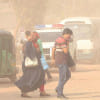Bangladesh air worst in the world, again

The air quality of Bangladesh remained the worst in the world for four years in a row, said a global report.
Dhaka was the second most polluted capital in the world following New Delhi, according to The 2021 World Air Quality Report published yesterday by IQAir, a Swiss air quality technology company that specialises in protection against airborne pollutants and developing air quality monitoring.
It found that particulate matter in Bangladesh was 15 times the limit set by the World Health Organization.
The report summarises the main causes of pollution in Bangladesh as vehicular emissions, fumes from factories, brick kilns, and dust accumulations from different sources, especially in the cities, said the report.
After Bangladesh, the four countries with the most polluted air were Chad, Pakistan, Tajikistan and India.
The average annual airborne particles, referred to in the report as PM2.5, in Bangladesh was 76.9 microgrammes per cubic metre (µg/m3) of air. WHO's recommended limit set in September last year is 5 µg/m3.
IQAir collected the data from five places in Bangladesh, according to its website.
With an annual average PM2.5 concentration of 78.1 µg/m3, Dhaka ranked the second most polluted capital in the world, only surpassed by Delhi's 85.0 µg/m3.
PM2.5 refers to particulate matter which measures up to 2.5 microns in size, and has a range of chemical makeup and sources.
The PM2.5 concentration was 66.8 µg/m3 in Pakistan and 58.1 µg/m3 in India.
"Central and South Asia had some of the world's worst air quality and were home to 46 of the world's 50 most polluted cities," the report said, analysing data of 6,475 cities in 117 countries, regions and territories collected in 2021.
Not a single country managed to meet the WHO's air quality standard in 2021.
Air pollution in Bangladesh increased the risks for bouts of chest infections that can lead to susceptibility to respiratory conditions such as influenza and pneumonia, lung cancer and can wreak havoc on the human body, with all organs being susceptible to damage, particularly the liver and kidneys, the report said. Children who are exposed to high levels of pollution can end up with developmental problems.
WHAT CAN BE DONE
With years of collective work from both the government and citizens, dents may be put into the levels of pollution via the implementation of fines and punishments for those that exceed air pollution levels in any given area.
The study recommended phasing out the old vehicles and the use of diesel in automobiles and moving to cleaner fuel sources.
"As stated, a highly concentrated effort would need to take place over the coming years, if Bangladesh is to see its position as world's most polluted country changed for the better," read the report.
Air pollution is now considered to be the world's largest environmental health threat, accounting for seven million deaths around the world every year. It is estimated that in 2021, the deaths of 40,000 children under the age of five were directly linked to PM2.5 air pollution.
"This report is a wakeup call, revealing how people worldwide are denied access to clean air ... Breathing clean air should be a basic human right, not a privilege," said Greenpeace India Campaign manager Avinash Chanchal in a statement.

 For all latest news, follow The Daily Star's Google News channel.
For all latest news, follow The Daily Star's Google News channel. 






Comments